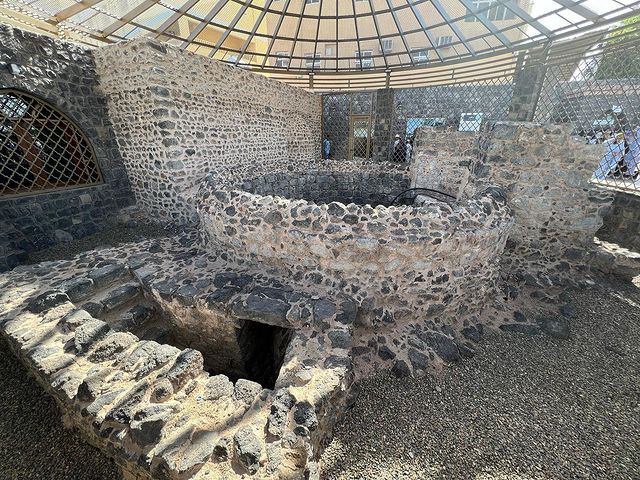During the time of the Prophet Muhammad (saw), Quba was a village located 6 miles from Madina on the road to Mecca. Over time, it grew and became a neighborhood of the expanding city. The decreasing distances mentioned by later authors are due to this. The fact that the traveler Ibn Jubayr referred to it as a “great city” indicates that Qubâ had developed significantly until the 13th century. The village, famous for its wells and date gardens, took its name from a well located there. The Ghars Well Madina and Arees wells, praised by the Prophet Muhammad ( saw ) as “springs of Jannah” and where his ring was dropped, are also located here. The village also had a few tall houses (udhuum), and during the Hijrah ( migration), the arrival of the Prophet Muhammad ( saw ) was seen and announced by a Jewish girl who climbed to the roof of a three-story house. During the migration, the Prophet Muhammad (saw ) stayed in Qubâ for a while as a guest in the house of Qulsûm b. Hidm, a member of the Amr b. Awf branch of the tribe of Aws. He also had conversations with his companions in the house of Sa’d b. Haysema ( rad anh), which he found more suitable due to its size. Different sources provide different numbers for the number of days the Prophet stayed in Qubâ; according to Ibn Hisham, it was four days, while according to a narration reported by Bukhari, it was fourteen days. During his stay in Qubâ, the Prophet (saw ) personally participated in the construction of the first mosque, which he had built. It is also narrated that the migrants who had previously come to Qubâ had built a mosque here or in the nearby Usbe, and that Salim Mawla Abu Huzeyfe led them in prayer. The mosque mentioned in the Quran as “whose foundation was laid from the first day on righteousness” (At-Tawbah 9:108) is most commonly believed to be Qubâ Mosque; in the verse, the people of Qubâ are praised for their material and spiritual cleanliness. In the previous verse (At-Tawbah 9:107), the Mosque of Diraar, which was established by the hypocrites to cause harm, conceal their disbelief, and create division among the believers, is mentioned and was ordered to be demolished by the Prophet Muhammad (saw).
Water wells, created by digging deep into the ground to benefit from underground waters, have always had a special place in regions such as the Arabian Peninsula, the Middle East, North Africa, and Western Asia where water resources are scarce due to their vital importance. Especially in the Arabian Peninsula, surface waters are extremely scarce. Nevertheless, wells are frequently opened to make use of the abundant underground water. Although there is water in the flat areas of Medina, these waters are warm and brackish, close to the heat. According to historical sources, before the Hijrah, the people of Madina used to supply their water from the southern regions far from the city. This was extremely difficult and exhausting for the people of Medina. The Prophet (saw) witnessed the water shortage in this blessed city where he migrated and therefore made special prayers at every water source he visited. The Messenger of Allah (saw) emphasized the importance of water wells, encouraged those who had the means to dig or buy wells. During the time of the Prophet (peace be upon him), there were many wells where he performed ablution, drank water, or made prayers. The most important well in this regard, which is still visited in present-day Medina, is undoubtedly the Gars Well. In Medina, which gained special importance with the arrival of the Prophet (saw), the first water offered to him was the water of the Gars Well. Due to its softness and good taste, Prophet Muhammad (saw) praised it by saying, “How beautiful this water is.” During his stay in Medina, the Prophet (saw) used this water both for drinking and other purposes. This water, which the Noble Rasool (saw) took care to use, is so important in his life that shortly before his passing, he entrusted the land of Medina to Hazrat Ali, saying, “O Ali, when I pass away, take care of the Gars Well.” In other narrations, it is mentioned that when our Prophet passed away, he ordered that the water from this well be used for his ritual washing with seven pitchers.




